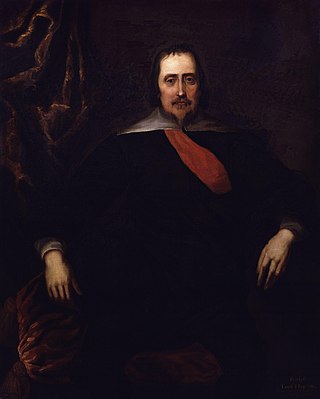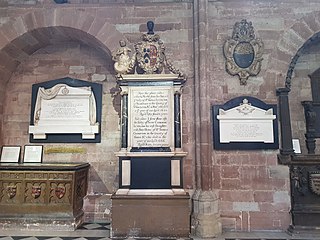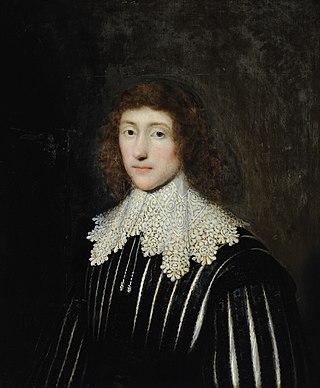Related Research Articles

Ralph Hopton, 1st Baron Hopton was an English politician, military officer and peer. During the First English Civil War, he served as Royalist commander in the West Country, and was made Baron Hopton of Stratton in 1643.
Sir Henry Herbert was Master of the Revels to both King Charles I and King Charles II, as well as a politician during both reigns.

Sir Thomas Lyttelton, 1st Baronet was an English Royalist officer and politician from the Lyttelton family during the English Civil War.

Nathaniel Fiennes was a younger son of the Puritan nobleman and politician, William Fiennes, 1st Viscount Saye and Sele. He sat in the House of Commons at various times between 1640 and 1659, and served with the Parliamentarian army in the First English Civil War. In 1643, he was dismissed from the army for alleged incompetence after surrendering Bristol and sentenced to death before being pardoned. Exonerated in 1645, he actively supported Oliver Cromwell during The Protectorate, being Lord Keeper of the Great Seal from 1655 to 1659.

Sir Hardress Waller, was an English Protestant who settled in Ireland and fought for Parliament in the Wars of the Three Kingdoms. A leading member of the radical element within the New Model Army, he signed the death warrant for the Execution of Charles I in 1649; after the Stuart Restoration in 1660, he was condemned to death as a regicide, a sentence commuted to life imprisonment.

The First English Civil War took place in England and Wales from 1642 to 1646. It is part of the 1639 to 1653 Wars of the Three Kingdoms, which also include the Bishops' Wars, the Irish Confederate Wars, the Second English Civil War, the Anglo-Scottish war (1650–1652) and the Cromwellian conquest of Ireland. Historians calculate some 15% to 20% of all adult males in England and Wales served in the military between 1639 and 1653, while around 4% of the total population died from war-related cause, versus 2.23% in World War I. These figures illustrate the impact of the conflict on society in general, and the bitterness it engendered.

William Russell, 1st Duke of Bedford KG PC was an English nobleman and politician who sat in the House of Commons from 1640 until 1641 when he inherited his Peerage as 5th Earl of Bedford and removed to the House of Lords. He fought in the Parliamentarian army and later defected to the Royalists during the English Civil War.

William Cavendish, 3rd Earl of Devonshire, KB, FRS was an English nobleman and politician, known as a royalist supporter.

Isaac Penington was an English politician who sat in the House of Commons from 1640 to 1653. He was Lord Mayor of London in 1642 and a prominent member of Oliver Cromwell's government.
Colonel George Fane was an English politician who sat in the House of Commons at various times between 1640 and 1663. He was Lord of the Manor of Hunningham. He fought in the Royalist army in the English Civil War.
Sir Thomas Bowyer, 1st Baronet was an English politician who sat in the House of Commons at various times between 1614 and 1642. He supported the Royalist cause in the English Civil War.
Thomas Howell (1588–1650) was a Welsh clergyman who was the Bishop of Bristol from 1644 to 1646.
Henry Parker (1604–1652) was an English barrister and political writer in the Parliamentarian cause.

Richard Arundell, 1st Baron Arundell of Trerice of Trerice in Cornwall, was an English politician who sat in the House of Commons at various times between 1640 and 1664 when he was raised to the peerage. He fought in the Royalist army during the First English Civil War.

Sir John Stawell or Stowell, 29 August 1600 – 21 February 1662, was MP for Somerset at various times from 1625 to 1662, and one of the leading Royalists in the West Country during the First English Civil War.

Thomas Smith or Smyth was an English politician who sat in the House of Commons at various times between 1628 and 1642. He fought for the Royalist cause in the English Civil War.
See also William Duckett (disambiguation)
Humphrey Hooke was an English politician who sat in the House of Commons from 1640 to 1642. He supported the Royalist cause in the English Civil War.
John Tailer was an English politician who sat in the House of Commons from 1642 to 1644. He supported the Royalist side in the English Civil War.
This is a timeline of events leading up to, culminating in, and resulting from the Wars of the Three Kingdoms.